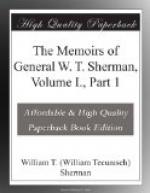that my career as a soldier was at an end. After
some four or five days spent in New York, I was, by
an order of General Scott, sent to Washington, to lay
before the Secretary of War (Crawford, of Georgia)
the dispatches which I had brought from California.
On reaching Washington, I found that Mr. Ewing was
Secretary of the Interior, and I at once became a
member of his family. The family occupied the
house of Mr. Blair, on Pennsylvania Avenue, directly
in front of the War Department. I immediately
repaired to the War Department, and placed my dispatches
in the hands of Mr. Crawford, who questioned me somewhat
about California, but seemed little interested in the
subject, except so far as it related to slavery and
the routes through Texas. I then went to call
on the President at the White House. I found
Major Bliss, who had been my teacher in mathematics
at West Point, and was then General Taylor’s
son-in-law and private secretary. He took me
into the room, now used by the President’s private
secretaries, where President Taylor was. I had
never seen him before, though I had served under him
in Florida in 1840-’41, and was most agreeably
surprised at his fine personal appearance, and his
pleasant, easy manners. He received me with great
kindness, told me that Colonel Mason had mentioned
my name with praise, and that he would be pleased
to do me any act of favor. We were with him
nearly an hour, talking about California generally,
and of his personal friends, Persifer Smith, Riley,
Canby, and others: Although General Scott was
generally regarded by the army as the most accomplished
soldier of the Mexican War, yet General Taylor had
that blunt, honest, and stern character, that endeared
him to the masses of the people, and made him President.
Bliss, too, had gained a large fame by his marked
skill and intelligence as an adjutant-general and
military adviser. His manner was very unmilitary,
and in his talk he stammered and hesitated, so as to
make an unfavorable impression on a stranger; but he
was wonderfully accurate and skillful with his pen,
and his orders and letters form a model of military
precision and clearness.
CHAPTER IV.
MISSOURI, LOUISIANA, AND CALIFORNIA
1850-1855.
Having returned from California in January, 1850,
with dispatches for the War Department, and having
delivered them in person first to General Scott in
New York City, and afterward to the Secretary of War
(Crawford) in Washington City, I applied for and received
a leave of absence for six months. I first visited
my mother, then living at Mansfield, Ohio, and returned
to Washington, where, on the 1st day of May, 1850,
I was married to Miss Ellen Boyle Ewing, daughter
of the Hon. Thomas Ewing, Secretary of the Interior.
The marriage ceremony was attended by a large and
distinguished company, embracing Daniel Webster, Henry
Clay, T. H. Benton, President Taylor, and all his




